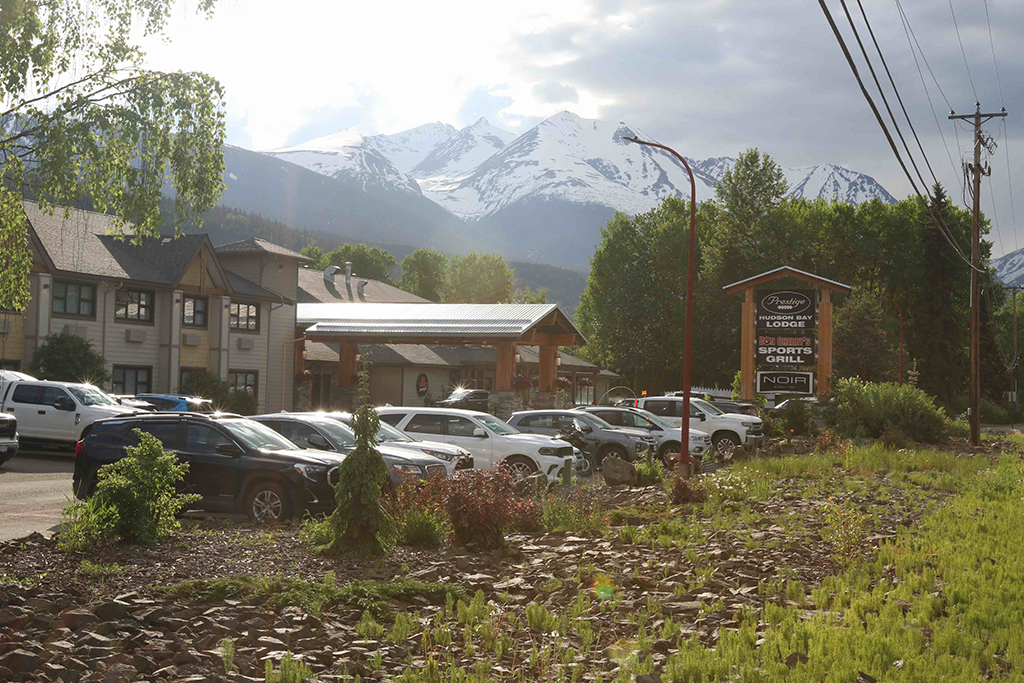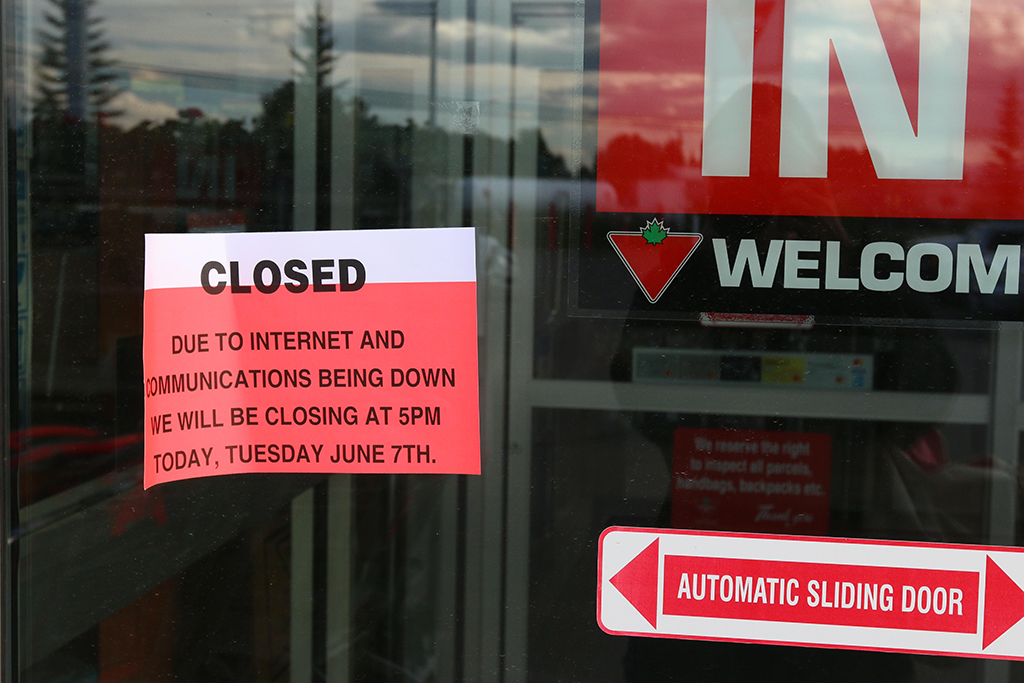“Bet you’ve had a stressful day.”
The customer at a Chevron station in Smithers places cash for his gas purchase — a $20 bill and a $10 bill — on the counter before leaving. The woman behind him steps forward, carefully counting out a fistful of quarters as her payment.
Store attendant Navroop Singh directs those without cash toward a short lineup at an ATM at the back of the store. It’s working, he says, and most customers are patient. A sign on the door has already warned them that credit cards are not an option.
“A few don’t get it,” he adds. “But they are figuring it out. Before coming in, they know the line is down.”
Shortly after 11 a.m. Tuesday, thousands of northern B.C. residents abruptly found themselves cut off from the rest of the world. The outage, which affected Telus and other providers that share the network, impacted phone and internet service along the Highway 16 corridor west of Burns Lake, leaving a large portion of the northwest without the ability to text, email, use computers or make phone calls until into the evening. Service resumed about nine hours later.
On the warm June day, many said they took advantage of the disconnection to enjoy the sunshine and some quiet.
But the outage raises bigger issues about connectivity in remote regions of the province, especially with increased risk from catastrophic wildfires and flooding raising the threats to essential infrastructure.
‘You feel very isolated from the rest of the world’
Any road trippers unable to buy gas in Smithers this week may also have struggled to find lodging.
Just down the highway at Prestige Hudson Bay Lodge, a sun-tanned traveller approaches the reception desk only to learn that the hotel is full. It’s almost 8 p.m. and the man explains that he’s been on the road all afternoon, without access to cell service. Reception suggests two other local hotels and the man leaves with a friendly, “No problem.”
Being at capacity is normal for this time of year, says general manager Daniela Bork, but even if there were a vacancy, they couldn’t offer the room without the ability to take a credit card deposit. Payment at the hotel restaurant was limited to cash and the accounts of guests who have already registered. Unlike the Chevron station, the ATM at Hudson Bay Lodge isn’t working.
“It’s very strange. You feel very isolated from the rest of the world,” Bork says. But she adds that outages in the region are not unheard of and that northerners tend to be fairly self-sufficient. “So, we’re really well prepared — as well as we can be.”
The hotel relies on cloud software for its reservation system, but staff are managing, she says. They rigged up a workaround by connecting a computer to the phone of an employee on the Rogers network, which isn’t affected by the outage. It allows them to communicate with other hotels in the Prestige chain, which can pass along booking information.

It’s not ideal, Bork admits, but it’s working.
“It’s one of those things. You don’t think of it until you’re in the situation,” she says. “Most people are very understanding and patient.”
Cut-off communities and 911 gaps
While Telus describes Tuesday’s service outage as “intermittent,” with the occasional call or email making its way out, service was largely unavailable for residents along Highway 16 between Burns Lake and Prince Rupert, a 500-kilometre stretch of highway that provides the main access corridor to communities on the north coast.
The region includes a string of communities large and small — Terrace, Smithers, Kitimat, Houston.
The interruptions were also inconsistent. While some ATMs worked, others did not. While some people reported making calls on a landline, others could not. And even though one credit card might work at the supermarket, the next person in line might not be so lucky.
Telus, which receives millions in government funding to connect remote regions, was short on answers as to the reasons why.
In an emailed statement to The Tyee, it said a fire caused by a downed tree damaged several telephone poles and fibre cables.
“Our crews immediately identified the issue and began working in partnership with BC Hydro to repair the damage, fully restoring all services by 10 p.m. PT Tuesday evening. We know how critical connectivity is for our customers, and we appreciate their patience as our crews worked to restore service,” the company says.
“Fortunately, access to 911 was not affected.”
That’s not entirely true, according to the company that manages emergency calls in B.C.
“Just to clarify, 911 was functioning normally. We were receiving, answering and transferring 911 calls coming through to us during that period,” says Jasmine Bradley, E-Comm 911’s executive director of communications and public affairs. “The challenge is that because of the service disruption on the Telus side, it impacted people’s ability to make voice calls.”
Bradley says the company’s records show that some calls from the affected area made it through to 911 Tuesday — either via Telus’s intermittent service or through an emergency feature that gives cellphones without network access the ability to “fail over” to another provider, such as Rogers.
“It really depended on what cell tower that cellphone was pinging from. If the call was hitting a Rogers cell tower, then the call would still be coming through to us,” she says. “Even intermittently with Telus customers, we were still getting calls.”
But E-Comm’s records don’t indicate how many calls did not make it through this week — and in the case of a broad communications outage affecting all local providers, there is no backup system for emergency calls.
“In extraordinary circumstances like that, where there is a major event like a wildfire or a massive earthquake impacting in a particular region, that’s where the emergency management response at the local government level comes into play,” Bradley says.
“If you’re not able to get through and you do need assistance, our advice is to try and make your way to the nearest fire hall, hospital or walk-in clinic for help, or to have somebody else go on your behalf if you’re unable to.”

Regional District of Bulkley-Nechako director of protective services Deborah Jones-Middleton declined The Tyee’s interview request but said in an emailed statement that the Telus outage affected communication systems for several fire departments within the regional district on Tuesday.
“However, each of the departments was able to find alternate communication systems to connect with the [Fire Operations Communications Centre] in Prince George,” she says. “We are very grateful to all three of the fire departments for their preparedness plan and quick response to this event.”
Jones-Middleton adds that flooding and wildfires present a risk to the system and says the regional district will continue to work with partners “to identify solutions that can be activated to support all fire departments and the RDBN Emergency Operations Centre if a similar event was to occur in the future.”
Few answers from Telus, and a beaver gets the blame
Telus did not respond to an interview request and followup questions about how many customers had been affected or what contingency plans the company has for future outages as the province faces increased risk from wildfires and flooding.
But floods and wildfires aside, all it took to sever communications in the northwest this week was a large rodent.
BC Hydro, which worked with Telus to fix the shared infrastructure, confirmed the detail in an email to The Tyee, saying that a beaver had felled a large aspen tree across power lines along Highway 16 east of Houston, causing the tree to become “energized” and catch fire, melting the cable casing.
“The location is a swampy area where the Bulkley River meanders close to the highway,” says BC Hydro’s northern community relations manager Bob Gammer. “Given the current spring snowmelt conditions in the region, the water levels at the outage location are higher than normal, making access more difficult for our crew.”
Twenty-one BC Hydro customers were also without power for about seven hours, he adds.
Gammer says unplanned power outages in the region are rare, with main transmission lines strung from steel lattice towers designed to withstand fire and rights-of-way kept clear of vegetation. Work is also underway to relocate hydro towers that were at risk from floods several years ago, he adds.
In October 2017, Bulkley Valley residents braced for a power outage as the flooding Telkwa River threatened to topple a BC Hydro tower in the remote Telkwa Pass. The service disruption was ultimately avoided, but Gammer says BC Hydro is in the process of building new concrete tower pads and towers in the area, work that’s expected to be completed next summer.
In August 2014, there was also chaos at gas pumps in Smithers as rumours spread that the China Nose wildfire, which threatened Highway 16 near Houston, could sever power to the region.
At the time, BC Hydro reassured residents that “backup power sources should kick in,” but the local municipality warned residents that fiberoptic cables could be affected.
“During any natural disaster, or event, that may cause power to be out for an extended period of time, we want our residential and business customers to be prepared,” BC Hydro’s Gammer says, adding that it’s important residents have a well-stocked and accessible emergency kit to get them through the first 72 hours.
A warning of coming risks
The recent outage underscores how dramatically our society relies on connectivity, says Greg Halseth, a geography professor with University of Northern British Columbia in Prince George.
“That connectivity is vital. It’s vital to our economy. People do their work on that tool. They also pay for their cup of coffee on that tool,” he says. “Increasingly, this is how we're sharing information.”
Everything from large industries to health care and education relies on the transfer of information through telecommunication services, he says.
Not to mention quality of life.
“One of the maxims of the world today is that people, especially in non-metropolitan B.C., they want to live locally and live globally, and so they rely on that connectivity,” Halseth says.
He says the northwest’s vulnerability to communications outages is just a piece of a broader infrastructure deficit across the province, with many communities lacking connection to the electrical power grid, cellphone networks and gas infrastructure.
In addition, road infrastructure “is still basically from the 1970s, not designed or suited to the needs of a modern economy,” Halseth adds.
And while some of B.C.’s vital infrastructure is public — think roads and hydro power — things like telephones and, now, internet are under the control of the private sector.
Halseth suggests infrastructure investments should be a priority for B.C.’s pandemic recovery efforts. “Not only does it stimulate the economy,” he says, “but it will create the very backbone of the economy moving forward.”
Because multiple service providers share the fibre network infrastructure, others were impacted by this week’s outage, including Prince Rupert-based CityWest, which services over 17,000 customers in northwest B.C.
The company says that leaves northwest residents vulnerable to widespread outages.
“Between Prince George and Prince Rupert there is currently no redundancy for internet services,” CityWest vice-president of peoples and markets Tanya Jenkins says via email. “If that network is damaged, like it was on Tuesday, the entire region can be left without communications services.”
CityWest is working on a solution.
The company is currently working with the Strathcona Regional District on a project called Connected Coast, which was initiated in early 2018 and will connect Vancouver and Prince Rupert via an underwater fibre cable, providing linkages for remote communities along the coast and Haida Gwaii, and backup internet to the north.
“This subsea fibre-optic link is an investment into the future for communities in B.C., to help ensure that any issues that occur above ground are eliminated,” Jenkins says. “The Connected Coast will be managed by CityWest exclusively, meaning the issues that happened this week to wire above ground on a pole managed by one of our competitors would not occur in our future footprint.”
The $45-million project is funded by the federal government’s Connected to Innovate program, Indigenous Services Canada and the province’s Connected British Columbia program. It is expected to provide communications services to 139 rural and remote communities.
Over 500 kilometres of fibre cable have been laid so far, Jenkins says.
The Tyee reached out to Emergency Management BC, which forwarded the request to the Ministry of Public Safety and Solicitor General. The ministry did not provide a response before deadline.
But during a flooding update provided by the province Thursday, The Tyee asked Pader Brach, executive director of regional operations with Emergency Management BC, what contingency plans exist if remote areas of the province are disconnected during an emergency.
Brach responded that the province has “a variety of communication that we often use with communities” during communications outages, including amateur radio communications and “some of the more older solutions or some of the ways that we used to communicate.”
“Obviously, when we lose that type of technology, we recognize that communities are quite reliant on that,” he says, adding that outages underscore the importance of communications during an emergency and he encourages communities to look at preparedness manuals on the Emergency Management BC website.
He suggests printing the literature off in advance and keeping it with emergency kits.
You just never know when a beaver might disrupt your internet connection. ![]()
Read more: BC Politics, Science + Tech, Urban Planning + Architecture

















Tyee Commenting Guidelines
Comments that violate guidelines risk being deleted, and violations may result in a temporary or permanent user ban. Maintain the spirit of good conversation to stay in the discussion.
*Please note The Tyee is not a forum for spreading misinformation about COVID-19, denying its existence or minimizing its risk to public health.
Do:
Do not: